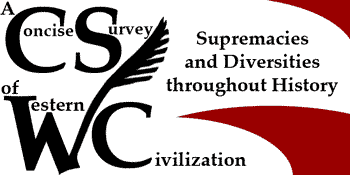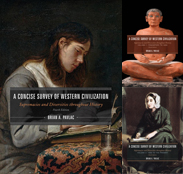Chapter 4
Trial of the Hellenes: The Ancient Greeks, 1200 B.C. to A.D. 146
- Link to Study Guide for this chapter
- Link to Primary Sources for this chapter
- Link to Art History for this chapter
- Link to Links to the Web for this chapter
To the Sea
The Hellenes created a merchant economy and expanded out of the Balkan Peninsula to Europe, Asia, and Africa.
The Political Animal
Greek governance moved from aristocracy through tyranny to democracy (even in the more restrictive form of oligarchy).
Metamorphosis
Some Greeks managed to defeat the powerful Persian Empire; then the divisions between democratic Athens and oligarchic Sparta resulted in a civil war which provided the opportunity for Macedon to dominate both Greeks and the Eastern Mediterranean.
The Cultural Conquest
Despite the break-up of Alexander's empire, Greek art, literature, and philosophy infused their neighbors.
Last Updated: 2023 June 3



